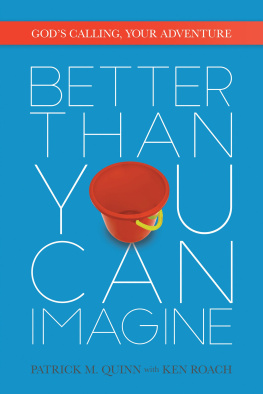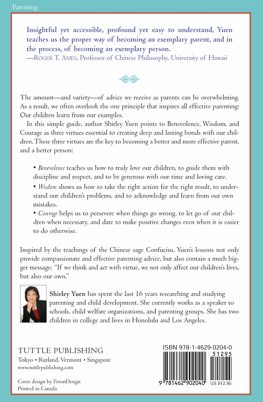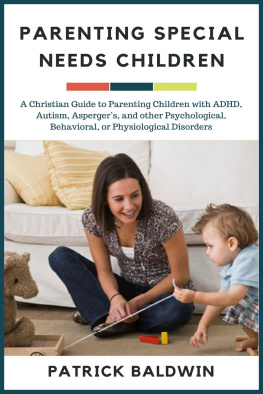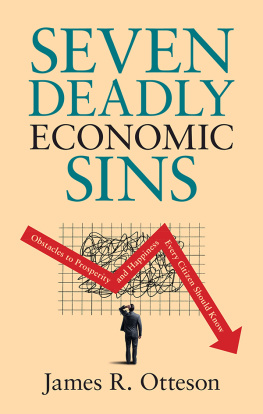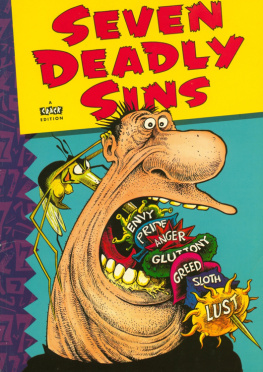QUESTIONS FOR INDIVIDUAL REFLECTION OR GROUP DISCUSSION
CHAPTERS 1 AND 2: PRIDE
How would you define pride?
What does Gods attitude toward pride reveal to you about His character? How do you see humility demonstrated by Jesus? See James 4:6.
Do you have any scratches or scars from times in your life when you told God or others, Ive got this; I dont need your help? What have you learned from those experiences? See Proverbs 3:5 NRSV .
Which would you say that you tend to rely on more to influence your children: your authority and power or your influence through relationship?
Does it cause you concern that your children may become much like you when they are grown, or does it give you hope? What changes do you need to make in yourself to provide the best model for them?
Review the Four Ways to Humble Yourself. What are some immediate actions you plan to take to help your children avoid pride? Are there long-term changes you need to begin making as well? Who will help hold you accountable to implement your plan?
CHAPTER 3: LUST
1. How would you define lust?
2. What does Gods attitude toward lust reveal to you about His character? How do you see purity demonstrated by Jesus? See 1 Thessalonians 4:38.
3. Why is it important to communicate to our children that God is not opposed to pleasure? What messages about morality and pleasure are you sending to your children?
4. What have you learned from your own past struggles with lust and addictive behaviors? How are you finding the accountability and support that you need now?
5. How do you help your children avoid the trap of secret sins while allowing them appropriate levels of privacy for their age? What additional safeguards do you think are necessary in todays digital world?
6. Review the Three Steps to Breaking the Chain. Make a plan for how you will put one or more of these steps into action in your family, and share it with someone whom you can trust to support you.
CHAPTER 4: ENVY
1. How would you define envy?
2. What does Gods attitude toward envy reveal to you about His character? How do you see acceptance demonstrated by Jesus?
3. Recall a time that you struggled with envy because you compared yourself with others. What can you learn from your experience that you could pass on to your children?
4. Do you know which aspects of their identities your children struggle to accept about themselves? How could you have a conversation with your children to uncover any self-rejection they are experiencing?
5. What language do you need to use more of to help your children learn to accept themselves and celebrate their strengths? What language do you need to use less often? See Colossians 3:10.
6. Review the Eight Unenvious Steps. Pick one or two to try out in the next week, and then revisit the list to see if there are others you should implement.
CHAPTER 5: GREED
1. How do you define greed?
2. What does Gods opposition to greed reveal to you about His character? How do you see generosity demonstrated by Jesus?
3. How has greed affected your relationships in the past? Share an example with your children of how you had to choose between focusing on people and focusing on things, and what you learned from that experience.
4. The deadly sin of greed has its roots in the fear of not having enough. What triggers that fear in your own heart? When do your children most struggle with that fear? See Matthew 6:2527.
5. Review the Three Greed Busters. Is there one that stands out for your family to use? Write down your strategy for putting it into practice.
CHAPTER 6: GLUTTONY
1. How do you define gluttony?
2. What does Gods opposition to gluttony reveal to you about His character? How do you see self-discipline demonstrated by Jesus?
3. How is it possible to be blessed by less? Share an experience with your children when you learned that you could actually experience more joy by having less of something for a season. See 2 Corinthians 12:710.
4. Does the concept of rhythm rather than balance resonate with you as a way to bring health to your family life? When is the last time you evaluated your schedule to see if your life is in rhythm?
5. Review the Three Wolf Tamers. Set a date that you want to start using one of them, and ask your spouse or a friend to check in on your progress.
CHAPTER 7: SLOTH
1. How do you define sloth? See Proverbs 6:611.
2. What does Gods opposition to sloth reveal to you about His character? How do you see diligence demonstrated by Jesus?
3. Have you had an experience when you either experienced a reward because of diligence or lost an opportunity due to laziness? Share what you learned with your children.
4. Would you say your children are like the antself-motivated by a greater purpose in lifeor are they only motivated by external pressure? How can you help each of them gain a vision for a higher calling in life?
5. Have you or your children experienced a failure or loss that has caused you to give in to despair? How can you reawaken hope in your family? See Psalm 51:12.
6. Review the Three Cups of Coffee. Brainstorm some creative ways to have a conversation with each of your children about at least one of these, and then pick one idea to put into action.
CHAPTER 8: WRATH
1. How would you define wrath? From Gods point of view, what are the appropriate situations for righteous anger?
2. Have you ever thought of humanity (including yourself) as having a God-given responsibility to bring justice to the world? What experiences have you had with justice or injustice that could provide a teaching moment for your children? See Micah 6:8.
3. Do you need to apologize to anyone in your house for hurtful things you have said or done in an outburst of anger?
4. Are the rules in your house set up in a way that promotes the idea of justice to your children? Are there steps you need to take to make sure the rules are clear, the consequences are just, and the enforcement is consistent?
5. Review the Three Temper Tamers. Ask yourself which one you most needed to hear for yourself and then which one might most apply to each of your children. Pray through your ideas and make a commitment to God to work on the one(s) that need work.
CHAPTER 9: THE VIRTUES
1. How would you define virtue? How would it reshape your parenting to think of virtue not merely as doing the right thing in the present but also as forming habits that shape whom your children will become tomorrow?
2. What does Gods desire for His children to grow in virtue reflect about His character? How do you see the virtues perfected in Jesus? See Proverbs 23:1516 NLT .
3. Trying to implement all seven virtues at one time could be overwhelming. How can you develop a plan for working through them gradually? Consider establishing a virtue of the week or month in your home. Brainstorm small ways you could reinforce that virtue through words and actions throughout that week or month.
4. Create a chart with all seven virtues, and post it on your refrigerator or some other visible place to track your progress. Consider keeping a virtues journal to record your journey and the life lessons you gain along the way.
CHAPTER 11: WHAT IF ITS TOO LATE?
1. Do you have regrets about your parenting that are keeping you stuck in the past? Confessing our sins to God is always the first step, but verbalizing our mistakes to another person can sometimes help in gaining closure. Find a trusted friend or wise counselor with whom you can talk through your regrets, not so you can make excuses but so you can find the best ways to move forward.
2. How can you work through taking appropriate responsibility for your own failures and move forward into trusting God to work all things together for good (Romans 8:28) in your childrens lives?
Next page

